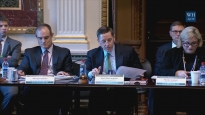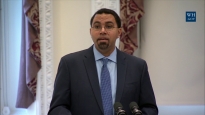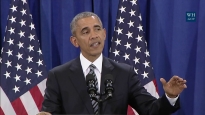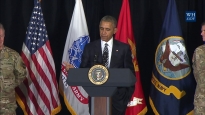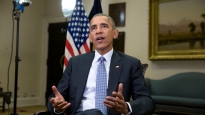The 2010 National Medal of Arts and National Humanities Medal Ceremony
March 02, 2011 | 25:41 | Public Domain
President Obama awards the 2010 National Medal of Arts and National Humanities Medal in a ceremony at the White House.
Remarks by the President Awarding the 2010 National Medal of Arts and National Humanities Medal
1:54 P.M. EST
THE PRESIDENT: Thank you very much, everyone. Please -- please, have a seat. Thank you. Well, hello, everybody. It is wonderful to have all of you here.
I want to make mention of some folks in particular that have helped us to celebrate the arts and the humanities for many years. First of all, if I’m not mistaken, our Democratic leader in the House of Representatives, Nancy Pelosi, a great champion of the arts, is here. There she is. (Applause.) Thank you, Nancy.
The Chairman of the National Endowment for the Arts, Rocco Landesman, is here. Where’s Rocco? There he is. (Applause.) The Chairman of the National Endowment for the Humanities, Jim Leach, is here. (Applause.) The two most powerful people in the White House -- Jill Biden and Michelle Obama -- are here. (Laughter and applause.)
And two recipients who were unable to be here, but who we love, I want to make sure to acknowledge: Meryl Streep and Harper Lee could not be here today, but they will be receiving their awards as well. So please give them a round of applause. (Applause.)
I was just told by my wife that I went off program because originally we were supposed to get everybody seated and I was supposed to then come in and make my formal remarks. And I bulled my way through to go ahead and see the honorees before they came out here to sit down because these are extraordinary people. One of the great joys of being President is getting a chance to pay tribute to the artists and authors, the poets and performers, who have touched our hearts and opened our minds -- or, in the case of Quincy Jones and James Taylor, set the mood. (Laughter.)
One of the people that we honor today, Joyce Carol Oates, has said, “Ours is the nation, so rare in human history, of self-determination; a theoretical experiment in newness, exploration, discovery.” That's what we do.
And for more than two centuries, this experiment has been conducted by revolutionaries and pioneers; by immigrants who braved hardship and inventors who tested new ideas; soldiers who fought for our freedom, and ordinary citizens who marched for their rights.
But we are here today because these men and women were not alone in these struggles. With them were the stories that sparked their imaginations; the poetry and the music that inspired their causes; the works of art and literature that spoke to their condition, and affirmed their desire for something more.
And I speak personally here because there are people here whose books or poetry or works of history shaped me. I've got these thumb-worn editions of these works of art and these old records where they were still vinyl, Sonny -- (laughter) -- before they went digital that helped inspire me or get me through a tough day or take risks that I might not otherwise have taken. And I think what's true for me is true for everyone here and true for our country.
The fact is that works of art, literature, works of history, they speak to our condition and they affirm our desire for something more and something better.
It was the writings of Thomas Paine that General Washington ordered his men to read before crossing the Delaware. It was spirituals sung by slaves around a campfire that helped to keep hope alive. We can think of the protest songs that tell the story of the civil rights movement, the photographs from the Great Depression that showed how folks were suffering but also how they were striving.
Time and again, the tools of change, and of progress, of revolution, of ferment -- they’re not just pickaxes and hammers and screens and software, but they’ve also been brushes and pens and cameras and guitars.
And the arts and the humanities help us through the hard times and they remind us of what make the good times worthwhile. After all, the goal doesn’t always have to be so lofty. Sometimes, we just need a break, a chance to laugh or escape from the moment.
So all of the individuals that we honor today are part of this tradition. We can point to their performances -- on stage or on film -- that we carry with us forever because we’ve been so moved. We can think of the novels that have chronicled the American experience -- from the streets of Newark to the courts of Alabama. How many young people have come to see the senseless cruelty of racism -- and the importance of standing up for what’s right -- through the eyes of a girl named Scout? How many young people have learned to think by reading the exploits of Portnoy and his complaints? (Laughter.)
We also remember the art that challenged our assumptions; the scholarship that brought us closer to the events of our history; the poetry that we loved -- or at least the poetry that we might recite to a girlfriend to seem deep. (Laughter.) Of course, we still hum the great songs by the musicians in this room -- songs that in many cases have been the soundtrack of our lives over decades.
And that’s why I’m so proud to have this opportunity to celebrate the contributions that all of you have made to our country. It’s why we have to remember that our strength as a people runs deeper than our military might; it runs deeper than our GDP -- it’s also about our values and our ideals that each generation is called to uphold, and that each artist helps us better understand.
And it’s also about the capacity of the arts and the humanities to connect us to one another. In a nation as big as ours, as diverse as ours, as full as debate and consternation as it sometimes is, what the people we honor here today remind us of is that kernel of ourselves that connects to everyone else and allows us to get out of ourselves, to see through somebody else’s eyes, to step in their shoes. And what more vital ingredient is there for our democracy than that?
In 1962, in the last months of his life, the poet Robert Frost was dispatched by President Kennedy to visit the Soviet Union. And it was a gesture of goodwill. Frost traveled and gave readings, filling venues all across Russia. What he really wanted to do, though, was have a chance to talk to Khrushchev. Frost was a poet, but he was also a pretty tough guy.
It wasn’t until the end of his trip that the meeting was arranged. And when they met, even though Frost was frail and sick, he decided he had to speak his mind to the Soviet leader. And Frost stood up and he said, “A great nation makes great poetry.” And then he told Khrushchev that he should reunite East and West Berlin.
A great nation should make great poetry. Like so many artists and musicians and writers and poets before him -- and so many that came after him -- Robert Frost wasn’t afraid to say his piece or speak truth to power. He wasn’t afraid to tell what was on his mind. He wasn’t held back by convention or what was considered normal or acceptable.
And that is an incredible power, an incredible resource. And we’re seeing that power all across the world today. That’s what challenges us. That’s what pushes us to be better, to be more faithful to the sense of humanity that so often can be lost in the experiences of our daily lives.
Pissarro once said, “Blessed are they who see beautiful things in humble places.” That is the blessing of those that we honor here today, and we are blessed that they are able to share what they see and what they hear.
So now it is my privilege to present these medals to our recipients in both the arts and the humanities. (Applause.)
MILITARY AIDE: The 2010 National Medal of Arts recipients:
Robert Brustein. (Applause.) The 2010 National Medal of Arts to Robert Brustein for his contributions to the American theatre as a critic, producer, playwright, and educator. As the founder of the Yale Repertory Theatre and the American Repertory Theatre and Institute for Advanced Theatre Training, and as the former theatre critic for The New Republic since 1959, Mr. Brustein has been a leading force in the develop of theatre and theatre artists in the United States. (Applause.)
Van Cliburn. (Applause.) The 2010 National Medal of Arts to Van Cliburn for his contributions as one of the greatest pianists in the history of music, and as a persuasive ambassador for American culture. Since his historic 1958 victory at the first International Tchaikovsky Competition in Moscow, Mr. Cliburn has reached across political frontiers with the universal message of beautiful music. (Applause.)
Mark di Suvero. (Applause.) The 2010 National Medal of Arts to Mark di Suvero for his achievements as one of the most prominent American artists to emerge from the Abstract Expressionist era. Exhibited throughout the world, Mr. di Suvero’s exemplary sculptures depict a strong political and social vision, demonstrating the power of the arts to improve our world. (Applause.)
Donald Hall. (Applause.) The 2010 National Medal of Arts to Donald Hall for his extensive contributions to American poetry. Through an illustrious career and as a Poet Laureate of the United States from 2006 to 2007, Mr. Hall’s work has inspired Americans and enhanced the role of poetry in our national life. (Applause.)
Accepting for Jacob’s Pillow Dance Festival, Ella Baff. (Applause.) The 2010 National Medal of Arts to Jacob’s Pillow Dance Festival for contributions to the development of dance in the United States. As America’s longest running international dance festival, thousands of people of all ages from across the United States and the world have Jacob’s Pillow to thank for opening their horizons to dance. (Applause.)
Quincy Jones. (Applause.) The 2010 National Medal of Arts to Quincy Jones for his extraordinary contributions to American music as a musician, composer, record producer, and arranger. As a master inventor of musical hybrids, he has mixed pop, soul, hip-hop, jazz, classical, African, and Brazilian music into many dazzling fusions, traversing virtually every medium, including records, live performances, movies, and television. (Applause.)
Sonny Rollins. (Applause.) The 2010 National Medal of Arts to Sonny Rollins for his contributions to American jazz music. Widely recognized as one of the most important and influential jazz musicians of the post-bebop era, Mr. Rollins’ melodic sensibilities, playing style, and solos have delighted audiences and influenced generations of musicians for over 50 years. (Applause.)
James Taylor. (Applause.) The 2010 National Medal of Arts to James Taylor for his remarkable contributions to American music. His distinctive voice and masterful guitar playing are among the most recognized in popular music and his expansive catalogue of songs has had a profound influence on songwriters and music lovers from all walks of life. (Applause.)
The 2010 National Humanities Medal recipients, accepting for Daniel Aaron, Anna Mundow Aaron. (Applause.) The 2010 National Humanities Medal to Daniel Aaron for his contributions to American literature and culture. As the founding president of the Library of America, he has helped preserve our nation’s heritage by publishing America’s most significant writing. (Applause.)
Bernard Bailyn. (Applause.) The 2010 National Humanities Medal to Bernard Bailyn for illuminating our nation’s early history and pioneering the field of Atlantic history. Dr. Bailyn’s two Pulitzer Prize-winning works, The Ideological Origins of the American Revolution and Voyagers to the West, have opened minds to the story of our country’s earliest days. (Applause.)
Accepting for Jacques Barzun, Marguerite Barzun. (Applause.) The 2010 National Humanities Medal to Jacques Barzun for his distinguished career as a scholar, educator, and public intellectual. One of the leaders in the field of cultural history, Dr. Barzun’s decades of teaching and dozens of books have engaged countless readers across our nation. (Applause.)
Wendell E. Berry. (Applause.) The 2010 National Humanities Medal to Wendell E. Berry for his achievements as a poet, novelist, farmer, and conservationist. The author of more than 40 books, Mr. Berry has spent his career exploring our relationship with the land and community. (Applause.)
Roberto González Echevarría. (Applause.) The 2010 National Humanities Medal to Roberto González Echevarría for his contributions to Spanish and Latin American literacy -- literary criticism. His path-breaking Myth and Archive: a Theory of Latin American Narrative is among the widely cited scholarly works in Hispanic literature. (Applause.)
Stanley Nider Katz. (Applause.) The 2010 National Humanities Medal to Stanley Nider Katz for a career devoted to fostering public support for the humanities. As president of the American Council of Learned Societies for more than a decade, he’s expanded the organization’s programs and helped forge ties among our libraries, museums and foundations. (Applause.)
Joyce Carol Oates. (Applause.) The 2010 National Humanities Medal to Joyce Carol Oates for her contributions to American letters. The author of more than 50 novels, as well as short stories, poetry and nonfiction, Ms. Oates has been honored with the National Book Award and the PEN/Malamud Award for excellence in the art of short story. (Applause.)
Arnold Rampersad. (Applause.) The 2010 National Humanities Medal to Arnold Rampersad for his work as a biographer and literary critic. His award-winning books have profiled W.E.B. Du Bois, Langston Hughes, Jackie Robinson and Ralph Ellison, and he has edited critical editions of the works of Richard Wright and Langston Hughes. (Applause.)
Philip Roth. (Applause.) The 2010 National Humanities Medal to Phillip Roth for his contributions to American letters. Mr. Roth is the author of 24 novels, including Portnoy’s Complaint and American Pastoral, which won the 1998 Pulitzer Prize, and his criticism has appeared in our leading literary journals. (Applause.)
Gordon Wood. (Applause.) The 2010 National Humanities Medal to Gordon Wood for scholarship that provides insight into the founding of our nation and the drafting of the United States Constitution. Dr. Wood is author and editor of 18 books, including The Radicalism of the American Revolution, for which he earned a Pulitzer Prize. (Applause.)
THE PRESIDENT: I think it is entirely appropriate for all of us to stand and give a warm congratulations to the recipients of these awards. (Applause.) Not the recipients -- you don't have to stand. (Applause.)
Well, congratulations to all the recipients. We’re going to take some quick pictures with them, and then usually we have a party around here. (Laughter.) Our Marine Band is very good and the food is pretty good around here too. So enjoy yourselves and thanks again for helping us to celebrate these extraordinary men and women of letters and the arts. Thank you.
END
2:19 P.M. EST
|
December 7, 2016
|
December 7, 2016
|
December 7, 2016
|
December 6, 2016
|
|
December 6, 2016
|
December 5, 2016
|
December 4, 2016
|
December 3, 2016
|
- &lsaquo previous
- …
- 3
- 4
- 5
- 6
- 7
- 8
- 9
- 10
- 11
- …
- next &rsaquo

